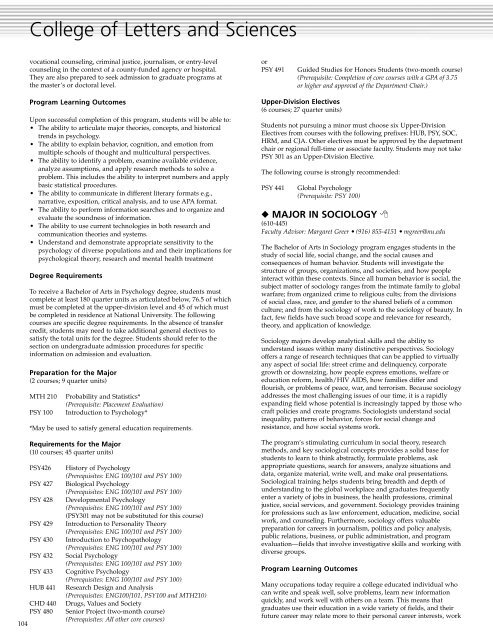Catalog 73 - National University
Catalog 73 - National University
Catalog 73 - National University
- No tags were found...
Create successful ePaper yourself
Turn your PDF publications into a flip-book with our unique Google optimized e-Paper software.
College of Letters and Sciencesvocational counseling, criminal justice, journalism, or entry-levelcounseling in the context of a county-funded agency or hospital.They are also prepared to seek admission to graduate programs atthe master’s or doctoral level.orPSY 491Guided Studies for Honors Students (two-month course)(Prerequisite: Completion of core courses with a GPA of 3.75or higher and approval of the Department Chair.)104Program Learning OutcomesUpon successful completion of this program, students will be able to:• The ability to articulate major theories, concepts, and historicaltrends in psychology.• The ability to explain behavior, cognition, and emotion frommultiple schools of thought and multicultural perspectives.• The ability to identify a problem, examine available evidence,analyze assumptions, and apply research methods to solve aproblem. This includes the ability to interpret numbers and applybasic statistical procedures.• The ability to communicate in different literary formats e.g.,narrative, exposition, critical analysis, and to use APA format.• The ability to perform information searches and to organize andevaluate the soundness of information.• The ability to use current technologies in both research andcommunication theories and systems.• Understand and demonstrate appropriate sensitivity to thepsychology of diverse populations and and their implications forpsychological theory, research and mental health treatmentDegree RequirementsTo receive a Bachelor of Arts in Psychology degree, students mustcomplete at least 180 quarter units as articulated below, 76.5 of whichmust be completed at the upper-division level and 45 of which mustbe completed in residence at <strong>National</strong> <strong>University</strong>. The followingcourses are specific degree requirements. In the absence of transfercredit, students may need to take additional general electives tosatisfy the total units for the degree. Students should refer to thesection on undergraduate admission procedures for specificinformation on admission and evaluation.Preparation for the Major(2 courses; 9 quarter units)MTH 210PSY 100Probability and Statistics*(Prerequisite: Placement Evaluation)Introduction to Psychology**May be used to satisfy general education requirements.Requirements for the Major(10 courses; 45 quarter units)PSY426PSY 427PSY 428PSY 429PSY 430PSY 432PSY 433HUB 441CHD 440PSY 480History of Psychology(Prerequisites: ENG 100/101 and PSY 100)Biological Psychology(Prerequisites: ENG 100/101 and PSY 100)Developmental Psychology(Prerequisites: ENG 100/101 and PSY 100)(PSY301 may not be substituted for this course)Introduction to Personality Theory(Prerequisites: ENG 100/101 and PSY 100)Introduction to Psychopathology(Prerequisites: ENG 100/101 and PSY 100)Social Psychology(Prerequisites: ENG 100/101 and PSY 100)Cognitive Psychology(Prerequisites: ENG 100/101 and PSY 100)Research Design and Analysis(Prerequisites: ENG100/101, PSY100 and MTH210)Drugs, Values and SocietySenior Project (two-month course)(Prerequisites: All other core courses)Upper-Division Electives(6 courses; 27 quarter units)Students not pursuing a minor must choose six Upper-DivisionElectives from courses with the following prefixes: HUB, PSY, SOC,HRM, and CJA. Other electives must be approved by the departmentchair or regional full-time or associate faculty. Students may not takePSY 301 as an Upper-Division Elective.The following course is strongly recommended:PSY 441Global Psychology(Prerequisite: PSY 100)◆ MAJOR IN SOCIOLOGY (610-445)Faculty Advisor: Margaret Greer • (916) 855-4151 • mgreer@nu.eduThe Bachelor of Arts in Sociology program engages students in thestudy of social life, social change, and the social causes andconsequences of human behavior. Students will investigate thestructure of groups, organizations, and societies, and how peopleinteract within these contexts. Since all human behavior is social, thesubject matter of sociology ranges from the intimate family to globalwarfare; from organized crime to religious cults; from the divisionsof social class, race, and gender to the shared beliefs of a commonculture; and from the sociology of work to the sociology of beauty. Infact, few fields have such broad scope and relevance for research,theory, and application of knowledge.Sociology majors develop analytical skills and the ability tounderstand issues within many distinctive perspectives. Sociologyoffers a range of research techniques that can be applied to virtuallyany aspect of social life: street crime and delinquency, corporategrowth or downsizing, how people express emotions, welfare oreducation reform, health/HIV AIDS, how families differ andflourish, or problems of peace, war, and terrorism. Because sociologyaddresses the most challenging issues of our time, it is a rapidlyexpanding field whose potential is increasingly tapped by those whocraft policies and create programs. Sociologists understand socialinequality, patterns of behavior, forces for social change andresistance, and how social systems work.The program’s stimulating curriculum in social theory, researchmethods, and key sociological concepts provides a solid base forstudents to learn to think abstractly, formulate problems, askappropriate questions, search for answers, analyze situations anddata, organize material, write well, and make oral presentations.Sociological training helps students bring breadth and depth ofunderstanding to the global workplace and graduates frequentlyenter a variety of jobs in business, the health professions, criminaljustice, social services, and government. Sociology provides trainingfor professions such as law enforcement, education, medicine, socialwork, and counseling. Furthermore, sociology offers valuablepreparation for careers in journalism, politics and policy analysis,public relations, business, or public administration, and programevaluation—fields that involve investigative skills and working withdiverse groups.Program Learning OutcomesMany occupations today require a college educated individual whocan write and speak well, solve problems, learn new informationquickly, and work well with others on a team. This means thatgraduates use their education in a wide variety of fields, and theirfuture career may relate more to their personal career interests, work
















